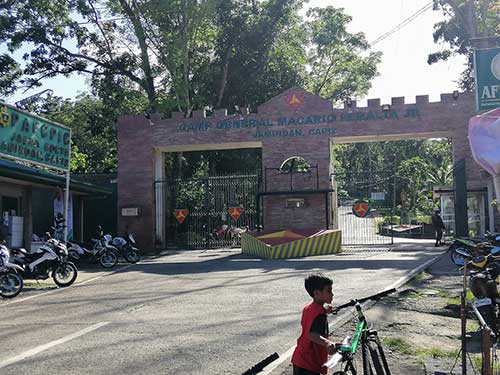
By Rjay Zuriaga Castor
The Department of Agrarian Reform-Western Visayas (DAR-6) is considering the country’s third-largest military camp in Jamindan, Capiz, as a relocation site for the 44 Ati individuals from Boracay, who are currently facing a legal battle over their ancestral lands.
DAR-6 Director Atty. Sheila Enciso told Daily Guardian on Tuesday, June 25, that they have identified a parcel of land in Camp General Macario Peralta Jr. in Barangay Jaena Norte in Jamindan, Capiz.
“Pursuant to the directive of the secretary, we coordinated with the Department of National Defense (DND) regarding the area we identified. The secretary’s directive is to allocate a minimum of one and a maximum of three hectares for the Ati people. We identified a large area within the military reservation under the DND,” she said.
The military camp, around 33,310 hectares, is home to the Philippine Army’s 3rd Infantry Division.
“We have coordinated with them, and they have 200 hectares reserved for offsite housing units for their off-base personnel. They said they are willing for the area to be used,” she added.
Enciso said they already conducted a preliminary ocular inspection in the area and asked the central office for funding for the survey and other activities.
The Ati tribe has been informed about the potential relocation during hearings on their land ownership disputes and has shown an unwillingness to relocate, according to the DAR-6 director.
“Nevertheless, we will still document it since the directive of the secretary is to document or identify more areas where we can relocate them,” she said.
Enciso said they have no other inventories of idle government-owned lands in Boracay Island and the mainland area of Aklan.
She also stressed that since there is a certification that one of the government-owned lands awarded to the Ati community is not suitable for agriculture, there is a big possibility that other areas are also the same.
“The outcome may be the same with other pieces of land because every piece of land has a claimant, and it will be a strenuous task,” she explained.
In the early morning of March 24, armed individuals forcibly entered and fenced a 1,282-square-meter land in Angol, Brgy. Manoc-Manoc in Boracay Island, occupied by the Boracay Ati Tribal Association (BATO).
The displaced Ati individuals were among the indigenous peoples granted Certificates of Land Ownership Award (CLOA) during the term of former President Rodrigo Duterte.
In November 2018, Duterte awarded the Ati community five CLOAs, which cover 3.1 hectares of their ancestral land.
However, in 2023, the Ati community received an order from DAR, which stated the agency allowed other claimants to apply for the cancellation of their CLOAs over the five lots awarded.
The March 2024 displacement stems from the protest of Digna Elizabeth Ventura, whose property covered the 1,282 sqm of land occupied by the BATO members.
DAR records show that Ventura filed a protest on April 10, 2019, against the inclusion of her property in the CLOA granted to the BATO members in 2018.
In 2020, the DAR-Regional Office 6 archived the case after ordering Ventura to show a soil analysis test regarding the suitability of the questioned land for agricultural purposes.
In 2023, Ventura presented a certification issued by the Bureau of Soils and Water Management, confirming that the subject land is “not suitable for agriculture.”
Section 4 of Republic Act No. 6657, or the Comprehensive Agrarian Reform Law of 1988, states that the lands to be awarded are “devoted to or suitable for agriculture.”
The DAR-6 then upheld the protest filed by Ventura on March 15, 2023, leading to the CLOA cancellation on March 5, 2024, as ordered by the Office of the Secretary.
The final order of CLOA cancellation cited the failure of the 44 claimants to show proof that would invalidate the certification that the disputed land is not suitable for agriculture.
Enciso said the BATO members are currently seeking refuge in the remaining four parcels of land with different CLOAs, which are also under legal dispute.




















